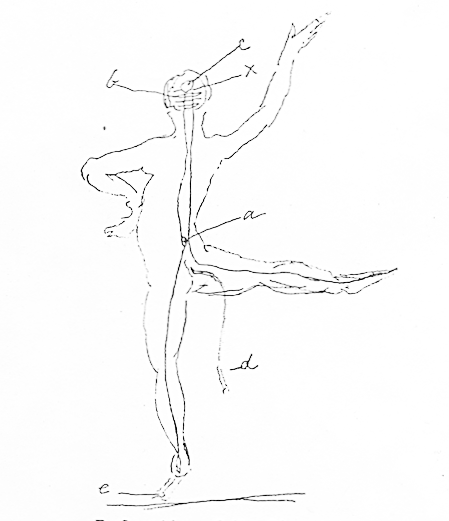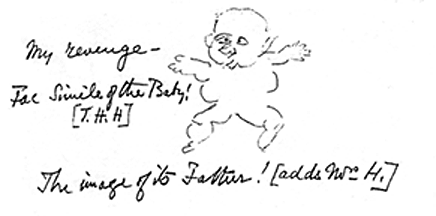
Explanation of the Figure
To Tyndall ALSO NOTED AS 67 - CHECK

Explanation of the Figure
The Beautiful, the Good, and the True attitudinizing after the manner described in this note.
a. a ganglionic corpuscle to which the nerve a e is attached;
a x, nerve continued from corpuscle to brain: b,arachnoid fluid composed of pure alcohol (in the case of this subject), in which floats c, the brain (in the proper sense) here very small; d, appendage believed to exist by the clergy.
To Editor, Westminister Review, with notes by THH and Henrietta Huxley on copy sent to John Tyndall]
[A quizz written by Mrs. Huxley. On some article written by my husband for the Westminster Review.]
Dear Sir,
The current number of The Westminster Review contains an article on "Glaciers and Glacier Theories" which may perchance attract your attention.
So far as I am aware there is nothing in the article itself which need render me solicitous of either avowing or concealing my responsibility as to its author and though I have ventured freely to criticise your views, I trust there is nothing in the tone of my little essay which requires apology to yourself personally. I should not have dreamed therefore, of intruding the fact of my authorship upon you were it not that my friend Professor Tyndall particularly desires that the article should not be ascribed to him.
Permit me therefore to say, that I am entirely responsible for the essay and that my friend did not see a line of it until its publication.
I trust that some day it may be my good fortune to have a more favourable introduction to you until when
believe me
Dear Sir
[meant for H's handwriting]
Unfaithfully yours,
T. H. Huxley.

Chamounix
[To Hooker]
My wife sends me intelligence of the good news you were so kind as to communicate to her. I need not tell you how rejoiced I am that everything has gone on well, and that your wife is safe and well. Offer her my warmest congratulations and good wishes. I have made one matrimonial engagement for Noel already, otherwise I would bespeak the hand of the young lady for him.
It has been raining cats and dogs these two days, so that we have been unable to return to our headquarters at the Montanvert which we left on Wednesday, for the purpose of going up Mont Blanc. Tyndall (who has become one of the most active and daring mountaineers you ever saw–so that we have christened him "cat"; and our guide said the other day "Il va plus fort qu'un mouton. Il faut lui mettre une sonnette") had set his heart on the performance of this feat (of course with purely scientific objects), and had equally made up his mind not to pay five and twenty pounds for the gratification. So we had one guide and took two porters in addition as far as the Grande Mulets. He is writing to you, and will tell you himself what happened to those who reached the top–to wit, himself, Hirst, and the guide. I found that three days in Switzerland had not given me my Swiss legs, and consequently I remained at the Grande Mulets, all alone in my glory, and for some eight hours in a great state of anxiety, for the three did not return for about that period after they were due.
I was there on a pinnacle like St. Simon Stylites, and nearly as dirty as that worthy saint must have been, but without any of his other claims to angelic assistance, so that I really did not see, if they had fallen into a crevasse, how I was to help either them or myself. They came back at last, just as it was growing dusk, to my inexpressible relief, and the next day we came down here–such a set of dirty, sun-burnt, snow-blind wretches as you never saw.
We heartily wished you were with us. What we shall do next I neither know nor care, as I have placed myself entirely under Commodore Tyndall's orders; but I suppose we shall be three or four days more at the Montanvert, and then make the tour of Mont Blanc. I have tied up six pounds in one end of my purse, and when I have no more than that I shall come back. Altogether I don't feel in the least like the father of a family; no more would you if you were here. The habit of carrying a pack, I suppose, makes the "quiver full of arrows" feel light.
115 Esplanade, Deal
My dear Tyndall–I don't consider myself returned until next Wednesday, when the establishment of No. 14 will reopen on its accustomed scale of magnificence, but I don't mind letting you know I am in the flesh and safe back.
The tour round Mont Blanc was a decided success; in fact, I had only to regret you were not with me. The grand glacier of the Allee Blanche and the view of Mont Blanc from the valley of Aosta were alone worth all the trouble. I had only one wet day, and that I spent on the Brenon Glacier; for, in spite of all good resolutions to the contrary, I cannot resist poking into the glaciers whenever I have a chance. You will be interested in my results, which we shall soon, I hope, talk on together at length.
As I suspected, Forbes has made a most egregious blunder. What he speaks of and figures as the "structure" of the Brenon is nothing but a peculiar arrangement of entirely superficial dirt bands, dependent on the structure, but not it. The true structure is singularly beautiful and well marked in the Brenon, the blue veins being very close set, and of course wholly invisible from a distance of a hundred yards, which is less than that of the spot whence Forbes' view of the (supposed) structure is taken.
I saw another wonderful thing in La Brenon. About the middle of its length there is a step like this of about 20 or 30 feet in height. In the lower part (B) the structural planes are vertical; in the upper (A) they dip at a considerable angle. I thought I had found a case of unconformability, indicating a slip of one portion of the glacier over another, but when I came to examine the intermediate region (X) carefully, I found the structural planes at every intermediate angle, and consequently a perfect transition from the one to the other.
I returned by Aosta, the great St. Bernard, and the Col de Balme. Old Simond was quite affectionate in his discourse about you, and seemed quite unhappy because you would not borrow his money. He had received your remittance, and asked me to tell you so. He was distressed at having forgotten to get a certificate from you, so I said in mine I was quite sure you were well satisfied with him.
On our journey he displayed his characteristic qualities, Je ne sais pas being the usual answer to any topographical inquiries with a total absence of nerve, and a general conviction that distances were very great and that the weather would be bad. However, we got on very well, and I was sorry to part with him.
I came home by way of Neuchatel, paying a visit to the Pierre a Bot, which I have long wished to see. My financial calculations were perfect in theory, but nearly broke down in practice, inasmuch as I was twice obliged to travel first-class when I calculated on second. The result was that my personal expenses between Paris and London amounted to 1.50!! and I arrived at my own house hungry and with a remainder of a few centimes. I should think that your fate must have been similar.
Many thanks for writing to my wife. She sends her kindest remembrances to you.–
Ever yours,
T. H. H.
|
THE
HUXLEY
FILE

|
| ||||||||||||||||||||||||||||||||||||||||||||||||||||||